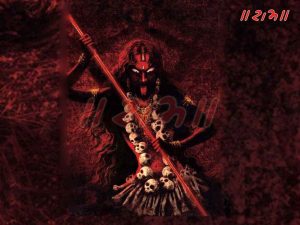In My Meditation Today: Sometimes I am a bitch, and that is A-OK. No part of my life deserves to be pushed away. It is time to stop beating up on myself for getting angry, or not being in a good mood, or being demanding. Every moment I live and every emotion I feel in each of these is a moment of life, which is to be revered and appreciated.
The Grand Story of the Divine Mother is told in three parts. Each section describes a battle between good and evil, and most often, the story is interpreted as the forces of good and evil external to us.
However, a more helpful interpretation for me is that it represents the battle between my basest instincts and my highest potential. The battles are bloody and gory because a fight to live from your highest potential is brutal, ugly, and metaphorically bloody and gory.
The seventh chapter of the Grand Story of the Divine Mother is one of the bloodiest in the myth. Shumbha and Nishumbha are in a frenzy after Devi’s summary dispatch of Dhumralochana and his army. So they send Chanda & Munda with a much bigger army. The instructions are to bring in ‘the vile woman’ unharmed if she will submit or beaten into submission if necessary. When they reach the foothills of the Himalayas, they find Devi riding her lion. She has a smile on her face until the demon army rushes towards her. As they move towards her with swords raised and bows drawn, Devi scowls and screams, and Kali emerges from her scowling brow.

Kali is not a pretty sight. She has a gaping mouth and a long tongue that hangs out; she is emaciated and black as night; Her eyes are red; she carries a skull-topped staff and wears a garland of human heads; her breasts are uncovered, and she wears a tiger skin as a skirt. Kali screams, stomps, and rushes toward Chanda & Munda’s vast army, devouring them, both literally and metaphorically.
She flings hordes of demons, chariots, and weapons into her mouth and pulverizes them with her teeth; others she slices with her sword or pounds with her skull-topped staff. As she single-handedly destroys his army, Chanda rushes towards her in a rage. She gets him by his hair and chops off his head. Munda meets the same fate in the next few minutes. With both their leaders slain, the rest of the army flees. Kali then picks up the heads of Chanda & Munda and hands them to the Devi, saying, “ Here is a present from me to you, Chanda & Munda, the beasts. You can now take care of Shumbha & Nishumbha yourself.”
The image of Kali is highly symbolic. Kali is the feminine form of Kala – which means both black /dark and time. Darkness is considered a representation of primordial energy – the womb of creation. At the other end of the spectrum, time is the ultimate destroyer, the force that turns mountains into deserts and a seabed into a forest, in an endless cycle of creation and destruction. Her long disheveled hair represents freedom from convention; the severed head she carries in her hand is the severed ego – everything that is stopping us from realizing the magnificence of our being. The garland of 50 heads she wears represents the 50 letters of the Sanskrit alphabet and symbolizes her knowledge and wisdom. Her unblinking eyes represent unbroken awareness of the truth of all existence.
In the context of our inner world, Kali is understood to be the force that creates, if necessary, forces transformation. She annihilates demons such as fear, self-doubt, and a lack of self-love, forcing one to step into one’s power.
Besides the symbolism in Kali’s form, what I love about this story is the unabashed display of power, yes, feminine power. Kali is not worried about how she looks. She is not worrying about what others think of her. She is angry and not ashamed about it. She is hurting and killing people, but is not apologetic because she knows that that is what is best for them. She is focused on completing her task, regardless of how ugly or violent it may seem to others.
The story is not about advocating violence and the actual killing of enemies. As we have mentioned before, the entire myth is an allegory, and the battle is in your mind. Every time you hesitate from doing something you know is right because you are worried about hurting someone, or even worse. After all, you are unwilling to live with the discomfort of sometimes being a “bitch” – you deny the Kali within you. You are stopping her from manifesting and creating the change, killing the demon that needs to be killed for you to move to the next phase of your spiritual evolution.
This story is about learning to be completely comfortable with all aspects of myself. In particular, it is about being comfortable with my anger and my power. It is first about acknowledging my power and being willing to wield it regardless of what anyone else thinks. That is what Devi does when she unleashes Kali on the army. She knew her power. She knew it was ugly, the polar opposite of the indescribably beautiful, smiling image the demons first encountered. She is entirely in love with all aspects of herself and therefore does not hesitate to reveal her ugly, angry, bitchy self.
Could you imagine how different young women would be if they grew up with a story like this that allowed them to be ugly, powerful, angry, and demanding?
I grew up thinking about Kali as a person not to be like. When I was little and ran around with unruly hair – which was quite often – I was often told not to be “Bhadrakali.” Women who get angry and yell are often called Bhadrakalis – not someone you want to be identified with.
On the other hand, the docile and amenable Seeta is what everyone wants their daughters to grow up to be. She is pleasing; she does not make you uncomfortable; everyone loves her and you for creating this lovely little princess who does everyone’s bidding.
The notion that some emotions are right to experience and others are wrong is ridiculous. Every moment I live, and every emotion I feel in each of these is a moment of life, which is to be revered and appreciated. So sometimes I am a bitch – and that is A-OK.
My book, ‘ More than Peace, Power & Presence through Meditation, has ten guided meditations that help you welcome and honor all your emotions.
